Related Research Articles
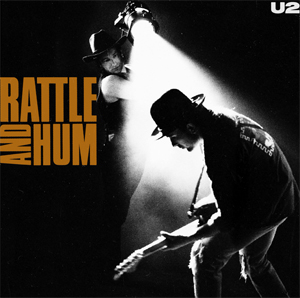
Rattle and Hum is a hybrid live/studio album by Irish rock band U2, and a companion rockumentary film directed by Phil Joanou. The album was produced by Jimmy Iovine and was released on 10 October 1988, while the film was distributed by Paramount Pictures and was released on 27 October 1988. Following the breakthrough success of the band's previous studio album, The Joshua Tree, the Rattle and Hum project captures their continued experiences with American roots music on the Joshua Tree Tour, further incorporating elements of blues rock, folk rock, and gospel music into their sound. A collection of new studio tracks, live performances, and cover songs, the project includes recordings at Sun Studio in Memphis and collaborations with Bob Dylan, B.B. King, and Harlem's New Voices of Freedom gospel choir.
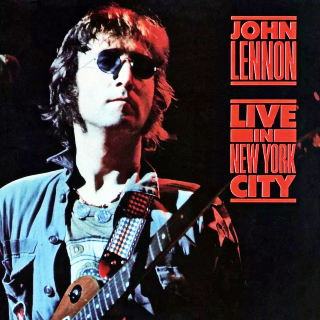
Live in New York City is a posthumous live album by English rock musician John Lennon with the Plastic Ono Elephant's Memory Band. It was prepared under the supervision of his widow, Yoko Ono, and released in 1986 as his second official live album, the first being Live Peace in Toronto 1969.

"Instant Karma!" is a song by English rock musician John Lennon, released as a single on Apple Records in February 1970. The lyrics focus on a concept in which the consequences of one's actions are immediate rather than borne out over a lifetime. The single was credited to "Lennon/Ono with the Plastic Ono Band", apart from in the US, where the credit was "John Ono Lennon". The song reached the top five in the British and American singles charts, competing with the Beatles' "Let It Be" in the US, where it became the first solo single by a member of the band to sell a million copies.

Three, also known as U2 3, is the debut release by Irish rock band U2. It was released in Ireland on 26 September 1979 through the CBS Ireland record label.

"Where the Streets Have No Name" is a song by Irish rock band U2. It is the opening track from their 1987 album The Joshua Tree and was released as the album's third single in August 1987. The song's hook is a repeating guitar arpeggio using a delay effect, played during the song's introduction and again at the end. Lead vocalist Bono wrote the lyrics in response to the notion that it is possible to identify a person's religion and income based on the street on which they lived, particularly in Belfast. During the band's difficulties recording the song, producer Brian Eno considered erasing the song's tapes to have them start from scratch.

The Vertigo Tour was a worldwide concert tour by the Irish rock band U2. Staged in support of the group's 2004 album How to Dismantle an Atomic Bomb, the tour visited arenas and stadiums between March 2005 and December 2006. The Vertigo Tour consisted of five legs that alternated between indoor arena shows in North America and outdoor stadium shows internationally. Much like the previous Elevation Tour, the indoor portion of the Vertigo Tour featured a stripped-down, intimate stage design. Protruding from the main stage was an ellipse-shaped catwalk that encapsulated a small number of fans.
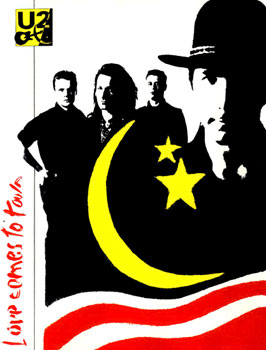
The Lovetown Tour was a concert tour by the Irish rock band U2, which took place in late 1989 and early 1990 following the release of Rattle and Hum. It was documented by noted rock film director Richard Lowenstein in the "LoveTown" documentary.
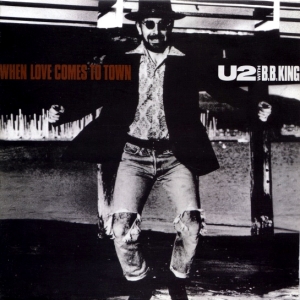
"When Love Comes to Town" is a song by Irish rock band U2 featuring blues guitarist B.B. King. It is the twelfth track from U2's 1988 album, Rattle and Hum, and was released in 1989 as the record's third single. The song was recorded at the historic Sun Studio in Memphis. "When Love Comes to Town" reached number one in the Irish Singles Chart, number six in the UK Singles Chart, number ten in the Dutch Top 40, and number two in the US Mainstream Rock Tracks chart.
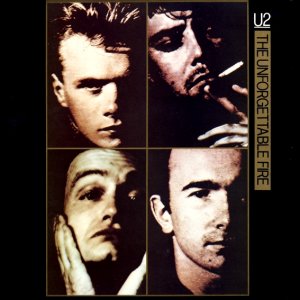
"The Unforgettable Fire" is a song by Irish rock band U2. It is the title track of their fourth album (1984), and was released as the album's second single in April 1985. The band cited an art exhibition by victims of the atomic bombings of Hiroshima and Nagasaki that was held at The Peace Museum in Chicago as the lyrical inspiration for the song. It became the band's third top-ten hit in the United Kingdom, reaching number six on the UK Singles Chart and number eight on the Dutch singles chart.

"40", also known as "40 ", is a song by Irish rock band U2. It is the tenth and final track on their 1983 album, War. The song is noted for its live performances; guitarist the Edge and bassist Adam Clayton trade instruments during performances of it, and as it was commonly played to end their concerts, the band would leave the stage one-by-one as the audience continued to sing the refrain "How long to sing this song?". The lyrics are a modification of the Bible's Psalm 40.

"Two Hearts Beat as One" is a song by Irish rock band U2. It is the seventh track on their 1983 album, War, and was released as its second single in the United States, United Kingdom, and Australia on 21 March 1983.
"Running to Stand Still" is a song by rock band U2, and it is the fifth track from their 1987 album, The Joshua Tree. A slow ballad based on piano and guitar, it describes a heroin-addicted couple living in Dublin's Ballymun flats; the towers have since become associated with the song. Though a lot of time was dedicated to the lyrics, the music was improvised with co-producer Daniel Lanois during a recording session for the album.
"Bullet the Blue Sky" is a song by Irish rock band U2, and is the fourth track from their 1987 album The Joshua Tree. Lyrically, the song was inspired by a trip that lead vocalist Bono made to Nicaragua and El Salvador, where he saw firsthand how local peasants were affected by United States military intervention in the region. Angered by what he witnessed, Bono asked guitarist the Edge to "put El Salvador through an amplifier." "Bullet the Blue Sky" is one of the band's most overtly political songs, with live performances often being heavily critical of political conflicts and violence.
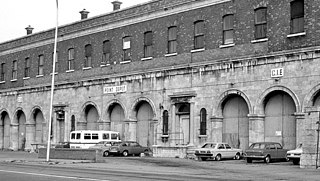
The Point Theatre (sometimes referred to as the Point Depot or simply as the Point) was a concert and events venue in Dublin, Ireland, that operated from 1988 to 2007, visited by in excess of 2 million people. It was located on the North Wall Quay of the River Liffey, amongst the Dublin Docklands. The Point was closed in the middle of 2007 for a major redevelopment and underwent a rebranding as The O2 in July 2008.
"October" is the seventh and title track from U2's 1981 album, October. It is a departure from U2's classic sound, as it is a quiet, almost instrumental piece. It was included as a hidden track on The Best of 1980–1990 compilation. It is the only track from October included in the compilation.
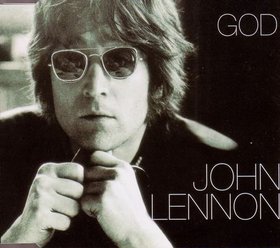
"God" is a song by English musician John Lennon, from his first post-Beatles solo album, John Lennon/Plastic Ono Band. The album was released on 11 December 1970 in the United States and the United Kingdom.

Bernard Patrick Fallon, known as BP Fallon, is an Irish DJ, author, photographer, and musician. He lives in Austin, Texas.

"I've Seen All Good People" is a song by the English progressive rock band Yes, written by frontman Jon Anderson and bassist Chris Squire and recorded on their third studio album, The Yes Album (1971). The almost 7-minute song is in two parts; the first, titled "Your Move", was released as a single in 1971 which peaked at number 40 in the US, which helped the group build momentum. The second part is entitled "All Good People".
This is a timeline of the history of rock band U2:

"One Tree Hill" is a song by Irish rock band U2 and the ninth track on their 1987 album The Joshua Tree. In March 1988, it was released as the fourth single from the album in New Zealand and Australia, while "In God's Country" was released as the fourth single in North America. "One Tree Hill" charted at number one on the New Zealand Singles Chart and was the country's second-most-successful hit of 1988.
References
- ↑ McCormick (2006), p. 207 [ incomplete short citation ]
- ↑ U2-Vertigo-Tour.com, God Part II performance history, accessed 25 September 2007.
- ↑ U2-Vertigo-Tour.com, Setlist for 23 April 1992, Vancouver, accessed 25 September 2007.